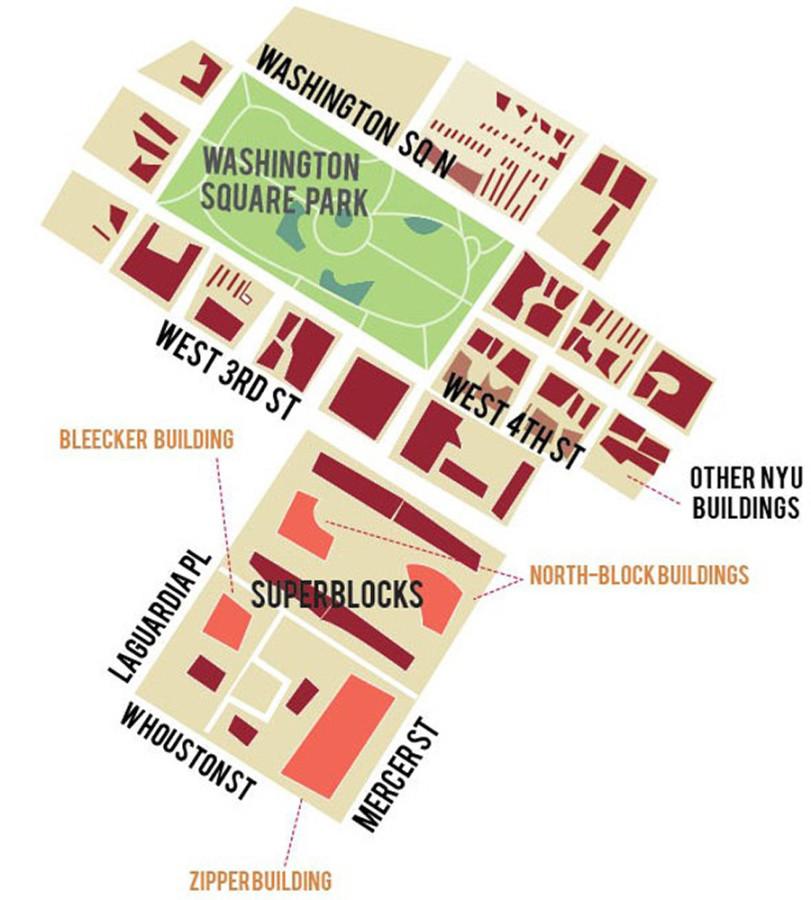Affordable housing groups show support for NYU 2031
April 30, 2015
Affordable housing groups announced on April 22 that they support NYU 2031, the university’s expansion plan, because a ruling against the plan could impede on future construction.
NYU 2031 includes the development of 2 million square feet in Greenwich Village that would provide more classrooms, art space and student housing for the Washington Square campus. The New York State Supreme Court ruled that the construction would need special permission from the state legislature, however, the court’s Appellate Division overturned this ruling in October 2014. NYU 2031’s opponents argued that the expansion plan would encroach on parklands on the Mercer Street superblocks.
Advocates of the plan from the affordable housing movement include the New York Housing Conference, the Association for Neighborhood and Housing Development, Phipps Houses and 99 other organizations that have aided in the establishment of affordable housing in New York.
Former federal judge Richard Holwell, Daniel Sullivan and Andrew Breidenbach of Holwell Shuster & Goldberg LLP filed an amicus brief siding with opponents of the expansion because they believe it puts private interests over the public good. Similarly, the affordable housing advocates issues a brief supporting NYU’s expansion with the rationale that it will create more opportunity for public resources.
“Petitioners’ argument seems to say that the only way to prevent an implied dedication is to lock the public out of municipal lands and to prevent stewardship of such properties by any public or private entity that is in any way connected with outdoor recreation or the preservation of open space,” the affordable housing advocates’ brief reads. “Worse public policy can hardly be imagined.”
NYU spokesperson John Beckman said the amicus brief shows that a ruling against the expansion plan will hurt future prospects for public development.
“What the amicus briefs highlight is that an adverse ruling by the Court of Appeals could hamstring the government when it tries to achieve a public good, be it creating low-cost housing, needed health care facilities or other uses beneficial uses,” Beckman said.
Beckman added that if the plaintiffs win the case it could harm public service providers, including the NYS Council of Mayors and Municipal Officials, New Yorkers for Parks, the Greater Hospital Association, in the future.
“A victory for the plaintiffs would be very bad public policy,” Beckman said.
Mark Crispin Miller, an NYU professor and member of NYU Faculty Against the Sexton Plan, said the city needs to work harder to preserve the little green space that remains. Miller added that the prosecutors are standing for NYU employees and the Village as a whole.
“It makes no sense to smash the city’s last few parks, in order to make room for still more towers — even if those new developments include some token segments of ‘affordable housing,’” Miller said. “The plaintiffs in this lawsuit are hardly just a few ‘litigious residents,’ but groups that very clearly represent the vast majority of Villagers and NYU’s own faculty.”
A version of this article was published in the Thursday, April 30 print edition. Email Alanna Bayarin at [email protected].













































































































































Fred Nadelman • May 29, 2015 at 10:03 am
Surely there are other locations for student housing that do not disturb the green spaces that are part of the unique natural and creative character of Greenwhich Village.
Fred Nadelman • May 6, 2015 at 3:56 pm
Preserve what is left of the city parks.